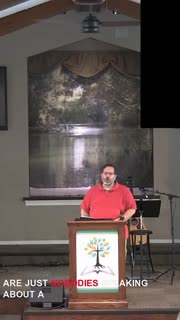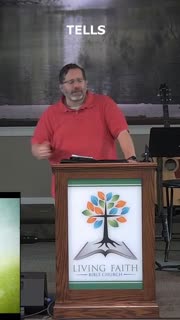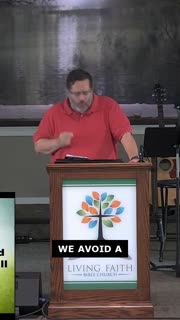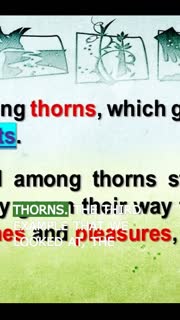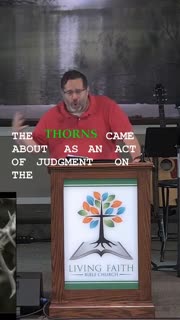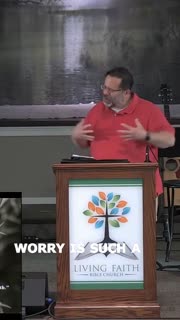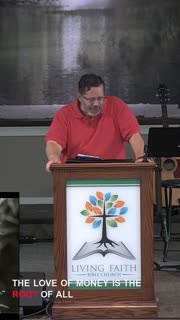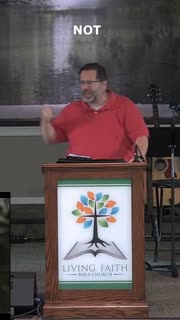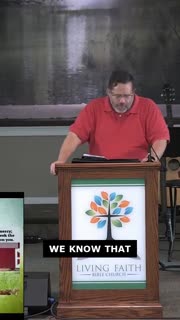Removing Thorns: Cultivating a Fruitful Spiritual Life
Devotional
Sermon Summary
Bible Study Guide
Sermon Clips
1. "The Dollar Car Wash is coming up. It is coming up on Saturday, September 7th, from 10 a.m. to 1 p.m. And it is a reschedule from our previous car wash. And again, it is an event. It is an outreach. It is a way for us to reach out to the community. Not to take a dollar, but to give a dollar. And to share the gospel of hope. And to wash someone's car for free, just like God does for us in salvation. It's all free. It's a gift." [30:34] (26 seconds)
2. "We are just nobodies speaking about a somebody. And I pray that. We could be more assured of that in our lives. And more willing to share that message with others. We come before you and recognize that you are alone our God and worthy of our praise. And so we praise you and thank you and honor you this day." [33:29] (22 seconds)
3. "The parable of the sower tells us not only about the seed, God's word, but also the various soils that that seed falls upon. And so there's a sense in which you could say that we could describe this parable not only as the parable of the sower, but also the parable of the soils, or the four soils. Remember what we've learned so far in this parable, about the seed. About the way the gospel message impacts various people." [38:21] (29 seconds)
4. "We avoid a stunted growth that could be choked by the thorns of life by having a full response to God's word firmly implanted into our hearts. So in contrast to us, we want a stunted response. We want a full response. Let's think a little bit about this stunted response. The stunted response, the word of God, the seed of the word of God falls upon thorny ground. And that represents this stunted response to the gospel that fails to produce a mature, a fully mature plant or life of faith." [41:12] (40 seconds)
5. "Thorns. The third example that we looked at, the shallow path, referred more to adversity, trials that might cause us to fall away. But here, Jesus is speaking more about adversity. Adversity as being the thing that takes us away. Right? And so Jesus talks about some of these things that could be distractions to us, like worries, like riches, like pleasures. And he speaks about them as life's thorns. And he says they do not mature." [42:02] (41 seconds)
6. "The thorns came about as an act of judgment on the part of God, to remind the sinners that this world that they lived in was now cursed. So there's a sense in which thorns have come in as a judgment against people. Isn't it remarkable then that Jesus, the eternal king who took on human flesh, was crowned with thorns? The judgment upon Adam and Eve fell upon Jesus' head and by his wounds were healed. That's an amazing story of biblical truth." [44:02] (33 seconds)
7. "Worry is such a picture of thorns. Thorns adequately represent what worry is. I've heard people define worry as mental strangulation. I'm not talking about general worry. I'm talking about sinful worry that chokes out spiritual life from us. George Mueller, who was a great Christian who ran an orphanage for many, many years, basically on top of the church, he just prayed that God would bring bread to feed the orphans and God would bring someone and they'd show up at the house and say, I don't know why, but God told me to bring bread to this house." [48:01] (40 seconds)
8. "The love of money is the root of all kinds of evil. Some people eager for money have wandered from the faith and pierce themselves with many griefs wandered from the faith. That sounds like the parable that Jesus is telling us why, because they have been eager for money because they've had a love of money. This verse does not say that money is the root of all evil. It's the love of money. You can be wealthy and still have your heart connected firmly with God, but there's a chance that that seeking of wealth may choke out that desire for the Lord." [50:58] (37 seconds)
9. "Pleasure itself is not anti-Christian, anti-Bible, but it's using or seeking that pleasure in opposition to God's revealed will where the problem lies. And Jesus also spoke about that. Whoever lusts after a woman lustfully commits adultery in her heart. And so what Jesus is saying, though, at the end of that verse in Matthew chapter five, is that it's better for you to lose one part of your body than for your whole body to be thrown in hell. Jesus is saying there can be a pursuit of pleasure that can destroy not only your marriage, but also destroy your life with God." [52:56] (37 seconds)
10. "We know that this parable teaches that the word of God is the seed, the message of the gospel, and that people need the word to be saved. Therefore, we need to hear the word regularly and apply it to our hearts. Do we agree that if we go to a place where we're not hearing the word of God in our lives, where we don't hear the word of God, that we're in danger of not allowing the seed to be implanted into our hearts? Do we also believe that there's an element of responsibility that we have for the condition of our hearts or our soil?" [01:03:08] (35 seconds)
Ask a question about this sermon
2. "We are just nobodies speaking about a somebody. And I pray that. We could be more assured of that in our lives. And more willing to share that message with others. We come before you and recognize that you are alone our God and worthy of our praise. And so we praise you and thank you and honor you this day." [33:29] (22 seconds)
3. "The parable of the sower tells us not only about the seed, God's word, but also the various soils that that seed falls upon. And so there's a sense in which you could say that we could describe this parable not only as the parable of the sower, but also the parable of the soils, or the four soils. Remember what we've learned so far in this parable, about the seed. About the way the gospel message impacts various people." [38:21] (29 seconds)
4. "We avoid a stunted growth that could be choked by the thorns of life by having a full response to God's word firmly implanted into our hearts. So in contrast to us, we want a stunted response. We want a full response. Let's think a little bit about this stunted response. The stunted response, the word of God, the seed of the word of God falls upon thorny ground. And that represents this stunted response to the gospel that fails to produce a mature, a fully mature plant or life of faith." [41:12] (40 seconds)
5. "Thorns. The third example that we looked at, the shallow path, referred more to adversity, trials that might cause us to fall away. But here, Jesus is speaking more about adversity. Adversity as being the thing that takes us away. Right? And so Jesus talks about some of these things that could be distractions to us, like worries, like riches, like pleasures. And he speaks about them as life's thorns. And he says they do not mature." [42:02] (41 seconds)
6. "The thorns came about as an act of judgment on the part of God, to remind the sinners that this world that they lived in was now cursed. So there's a sense in which thorns have come in as a judgment against people. Isn't it remarkable then that Jesus, the eternal king who took on human flesh, was crowned with thorns? The judgment upon Adam and Eve fell upon Jesus' head and by his wounds were healed. That's an amazing story of biblical truth." [44:02] (33 seconds)
7. "Worry is such a picture of thorns. Thorns adequately represent what worry is. I've heard people define worry as mental strangulation. I'm not talking about general worry. I'm talking about sinful worry that chokes out spiritual life from us. George Mueller, who was a great Christian who ran an orphanage for many, many years, basically on top of the church, he just prayed that God would bring bread to feed the orphans and God would bring someone and they'd show up at the house and say, I don't know why, but God told me to bring bread to this house." [48:01] (40 seconds)
8. "The love of money is the root of all kinds of evil. Some people eager for money have wandered from the faith and pierce themselves with many griefs wandered from the faith. That sounds like the parable that Jesus is telling us why, because they have been eager for money because they've had a love of money. This verse does not say that money is the root of all evil. It's the love of money. You can be wealthy and still have your heart connected firmly with God, but there's a chance that that seeking of wealth may choke out that desire for the Lord." [50:58] (37 seconds)
9. "Pleasure itself is not anti-Christian, anti-Bible, but it's using or seeking that pleasure in opposition to God's revealed will where the problem lies. And Jesus also spoke about that. Whoever lusts after a woman lustfully commits adultery in her heart. And so what Jesus is saying, though, at the end of that verse in Matthew chapter five, is that it's better for you to lose one part of your body than for your whole body to be thrown in hell. Jesus is saying there can be a pursuit of pleasure that can destroy not only your marriage, but also destroy your life with God." [52:56] (37 seconds)
10. "We know that this parable teaches that the word of God is the seed, the message of the gospel, and that people need the word to be saved. Therefore, we need to hear the word regularly and apply it to our hearts. Do we agree that if we go to a place where we're not hearing the word of God in our lives, where we don't hear the word of God, that we're in danger of not allowing the seed to be implanted into our hearts? Do we also believe that there's an element of responsibility that we have for the condition of our hearts or our soil?" [01:03:08] (35 seconds)

